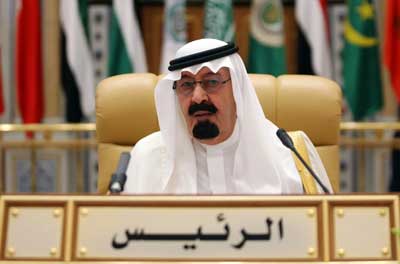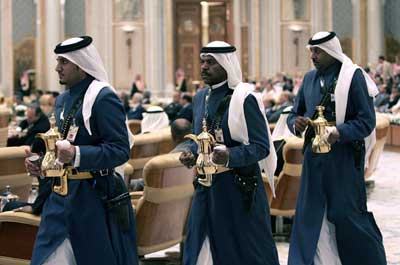
Saudi statement: the shock and the hook
NEW YORK - Perhaps one of the legendary anecdotes of slick craftiness relates to a Jewish merchant who keeps praying to God he should win the multi-million dollar weekly lottery in New York. As he implores before God every night, he complains that his friends, his neighbours and even his business associates have kept winning prize money that has evaded him. Why is he the only one who doesn't win the lottery, he asks sullenly. "Why don't you give me a break, Solomon?," the Almighty finally responds. "Why don't you go buy a ticket first?" The political parallel in the Middle East is Israel's unrelenting attempts to seek peace with Palestinians without conceding an inch of land annexed illegally after the 1967 war. "The Israelis want to win the lottery without paying for a ticket," says Jamal Khashoggi, a former Saudi Embassy adviser in Washington. At a meeting of the 21-member Arab League last week, Arab leaders once again re-affirmed the 2002 "land-for-peace" agreement to settle the Israeli-Palestinian conflict. A new initiative on the existing agreement, this time sponsored by Saudi Arabia, once again calls on Israel to return all lands captured in the 1967 war and the creation of a Palestinian state with its capital in East Jerusalem -- in return for permanent peace and diplomatic recognition of the state of Israel. But Israel, as always, has expressed ambivalence insisting on diplomatic recognition before it could launch direct talks with the Palestinians. It's the egg-before-chicken syndrome. Saudi Arabia — which hosted the Arab summit and has taken the lead as the new chairman of the League of Arab states — is seemingly disappointed that its closest ally, the US, is not doing enough to twist Israeli arms. King Abdullah of Saudi Arabia surprised his fellow Arab leaders and the Bush administration when he made a public statement last week that the British-American military intervention in Iraq was "an illegal foreign occupation". The Americans were so taken aback that some US officials told reporters to check whether there was a "mistranslation" of the King's statement, made originally in Arabic. But the translation didn't miss a beat. "In the beloved Iraq, the bloodshed is continuing under an illegal foreign occupation and detestable sectarianism." But he also said the "blame should fall on us, the leaders of the Arab nations, with our ongoing differences, our refusal to walk the path of unity. All of this has made the nation lose its confidence in us." In other words, the Arabs are to be blamed as much as the US for the current impasse — not excluding the Israelis, of course. The Saudi public posturing may well have been an attempt to play up to the rest of the Arab world where the US occupation of Iraq is not only unpopular but has also triggered strong anti-American sentiments. At the same time, it is conceivable that the strongly anti-US Saudi statement was a follow up to the recent Mecca meeting where the Saudis successfully brokered a power-sharing between Palestinian President Mahmoud Abbas and Hamas. The Bush administration is obviously unhappy with the agreement because it considers Hamas a "terrorist organisation". So does Israel. Both countries have boycotted Hamas despite the fact it was elected to power in democratic elections. But following the agreement, the European Union is planning to break its unified stand with the US by not only recognizing the coalition Palestinian government but also resuming aid which had been cut off from the earlier Hamas government in the Israeli occupied territories. The US was also taken by surprise last week when King Abdullah cancelled a planned visit to the US where he was to be hosted at a gala White House dinner reserved only for close US allies. These moves can also mean that the Saudis are trying to distance themselves from the Bush administration which is heading towards a constitutional crisis resulting from growing opposition in the Senate and the House of Representatives to the war against Iraq. Perhaps the Saudis are also aware that the popularity of the Bush administration is at its lowest in the US. Currently, Saudi Arabia is one of the largest suppliers of oil to the US, and in turn, the US is one of the largest arms suppliers to Riyadh. Neither country wants to lose the other. |
|| Front
Page | News | Editorial | Columns | Sports | Plus | Financial
Times | International | Mirror | TV
Times | Funday
Times || |
| |
Copyright
2007 Wijeya
Newspapers Ltd.Colombo. Sri Lanka. |

